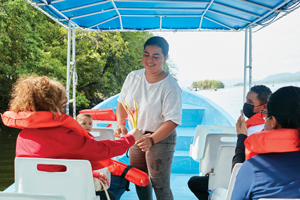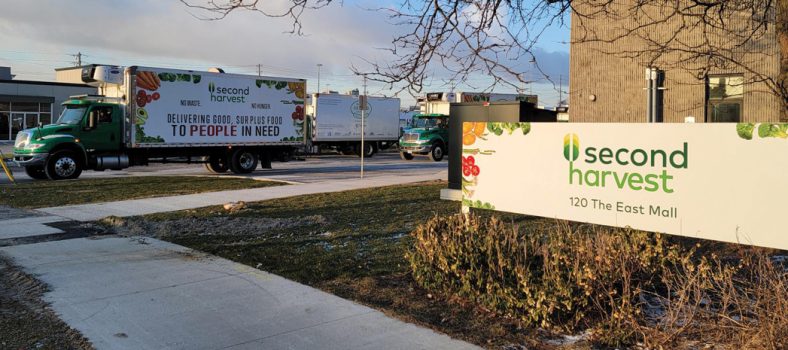By Rickesh Lakhani and Aneil Gokhale
It’s that time of year when the focus is on giving. But we think that needs to be different — the focus should be on being in service to others. So what does that shift look like? We’re here to share how this can be done.
Generosity is a powerful force. It can unite people. It can lift communities. It can move mountains.
As it stands though, while Canada is a diverse and beautiful quilt of different people, cultures, and races, generosity isn’t being shared equally. The Unfunded report outlines the disturbingly low support for Black-serving organizations, which are receiving as little as 7 cents for every $100 donated despite representing 3.5 percent of the Canadian population. Indigenous groups received about 0.5 percent of funds despite representing 4.9 percent of the population in Canada. Overall, 66 percent of the donations made in Canada go to just 1 percent of charities .
There are many reasons why funding isn’t making it to all corners of society, for example a lack of representation by marginalized communities in decision-making roles. However, groups that are serving and led by those most impacted by social issues are powerful forces to tackle broad issues affecting society. This is where so much of the innovation and impact in social change often happens.
Closing the gaps
Knowing that there are significant imbalances in giving, it’s important to consider them when making giving decisions:
- If supporting healthcare is important to you, what about an Indigenous-serving, led, and focused organization like Anishnawbe Health Foundation;
- If tackling education gaps is an area you want to impact, what about a Black-serving, led, and focused organization such as Visions of Science;
- Instead of directing philanthropy towards the largest charities, consider smaller and lesser-known organizations with budgets under $1 million, which represent the majority of charities in Canada, such as Youth Empowering Parents; and
- Consider groups that aren’t charities such as not-for-profits and community-led grassroots organizations. While you don’t get a tax receipt, many organizations with different models are doing innovative and important work, and there is a push for revised legislation in Canada which makes distributing funds to organizations like Helping Hands much easier.
A number of groups are already working towards closing these gaps and helping to reshape giving such as The Circle on Philanthropy, Foundation for Black Communities, The Black Opportunity Fund, and Justice Fund. In addition, Toronto Foundation annually releases the Good to Give Guide which highlights lesser known, often grassroots, and highly-impactful organizations to consider.
This is not an exhaustive list, just a starting point. When it comes to giving, you can do your own research and have honest, meaningful conversations with social impact organizations to learn about their work.

Have honest, meaningful conversations with social impact organizations to learn about their work.
How you give
In addition to the destination of giving, the process matters.
Power and control are often concentrated into the hands of a few. You can help change that by shifting wealth and decision making. Often, decisions are being made about communities without their input or leadership. This is a missed opportunity to engage the expertise and lived experiences of people to inform and guide where resources go and how they can be used to best serve the community.
As global consciousness about the need to shift towards more equitable philanthropy continues to grow, there are many initiatives and movements such as Trust-Based Philanthropy, Participatory Grantmaking, and Community-Centric Fundraising, that are reminding us of important themes and considerations that need to stay at the forefront of giving decisions.
For those in a position to distribute wealth and power, some key guidelines are:
- Ensure that decisions are made with the mantra “nothing about us without us” so that communities impacted by issues are providing input and leading funding decisions and processes.
- Recognize the power dynamics inherent in funding relationships and how they can hinder a strong relationship founded on trust and mutual interest in impact.
- Increase sustainability through multi-year commitments so that organizations can confidently hire staff and invest towards the future.
- Provide unrestricted giving which reduces administrative burden and allows those doing the work to make decisions on where funding can have the biggest impact.
- Reduce the burden that is created for social impact organizations in seeking, using, and reporting on funds so that they can focus efforts on the on-the-ground work.
- Be transparent about giving processes and decisions so that everyone is operating in good faith and time isn’t wasted.
- Embrace philanthropy as a tool for healing, equity, and for economic, social, and racial justice.
Where do we go from here
Philanthropy continues to evolve. Given what we’ve shared here, we know this won’t happen without time, commitment and action. So we leave you with this question and invite you to reflect on this as you approach your next giving decision.
How can I be more mindful of the impact of my giving and what work do I have to do in order to create that impact?
Better philanthropy is possible. You can be part of making it happen.
 Rickesh Lakhani believes that we are all responsible for each other’s success. He has over 15 years of experience in the social impact sector. He is the Founder of Radiance Advisory, supporting social impact organizations to align their actions with their values and build stronger cultures based on truth and trust. Prior to this, he was the Executive Director at Future Possibilities for Kids, a community-based organization serving children, and the Director, Campaign at United Way York Region, leading an $8M annual fundraising campaign. He sits on the Global Council for Community-Centric Fundraising, advocating for equity and social justice in philanthropy. He is a work in progress.
Rickesh Lakhani believes that we are all responsible for each other’s success. He has over 15 years of experience in the social impact sector. He is the Founder of Radiance Advisory, supporting social impact organizations to align their actions with their values and build stronger cultures based on truth and trust. Prior to this, he was the Executive Director at Future Possibilities for Kids, a community-based organization serving children, and the Director, Campaign at United Way York Region, leading an $8M annual fundraising campaign. He sits on the Global Council for Community-Centric Fundraising, advocating for equity and social justice in philanthropy. He is a work in progress.
 Aneil Gokhale is passionate about the intersection of philanthropy and community. Increasingly motivated by equity and social justice, he deeply focuses on ensuring that philanthropic resources are directed where they are needed most. He is currently Director, Philanthropy at Toronto Foundation where he helps individuals, families, professional advisors, companies and charities engage in strategic philanthropy. Since 2018, Aneil has been focused on “changing the face” of Canadian philanthropy and he and his team have welcomed 200+ new donors to the Foundation, all under the age of 45 and representing the varying diversity throughout Toronto. Aneil has worked in the philanthropic sector for over 15 years.
Aneil Gokhale is passionate about the intersection of philanthropy and community. Increasingly motivated by equity and social justice, he deeply focuses on ensuring that philanthropic resources are directed where they are needed most. He is currently Director, Philanthropy at Toronto Foundation where he helps individuals, families, professional advisors, companies and charities engage in strategic philanthropy. Since 2018, Aneil has been focused on “changing the face” of Canadian philanthropy and he and his team have welcomed 200+ new donors to the Foundation, all under the age of 45 and representing the varying diversity throughout Toronto. Aneil has worked in the philanthropic sector for over 15 years.
- Unfunded: Black Communities Overlook by Canadian Philanthropy. Pereira, Abokor, Ahmad, Abdikkarim. Report prepared by the Network for the Advance of Black Communities and Carleton University’s Philanthropy and Nonprofit Leadership program. 2020.
- Canadian charities giving to Indigenous Charities and Qualified Donees – 2018. Redsky, Brascoupe, Blumberg, Lang. Analysis of 2018 charity T3010 annual returns in Canada. 2021.
- The Giving Report 2018. CanadaHelps. 2018.




